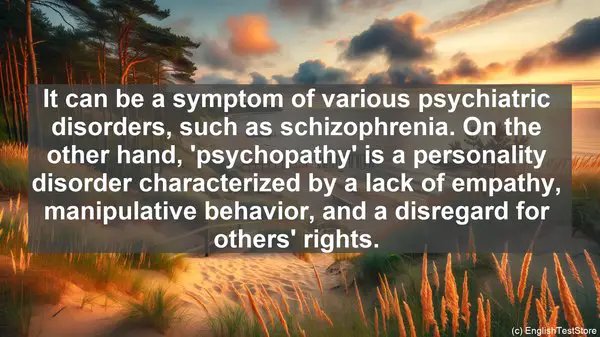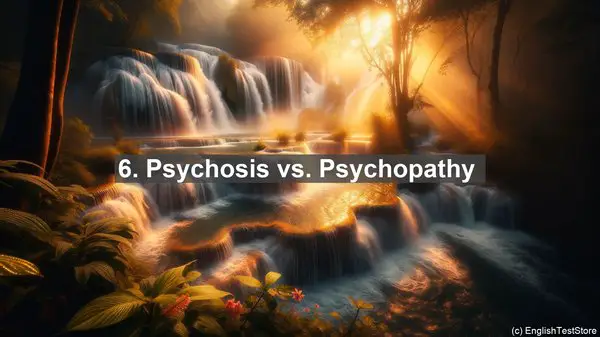Introduction
Welcome back to our channel. Today, we have an interesting topic to discuss – the top 10 commonly confused words in forensic psychiatry. As students, it’s crucial to have a strong grasp of these terms to excel in our studies and future careers. So, let’s dive right in!
1. Insanity vs. Incompetence
One of the most common confusions in forensic psychiatry is between ‘insanity’ and ‘incompetence.’ While both terms relate to mental health, they have distinct meanings. ‘Insanity’ refers to a state of mental illness that affects an individual’s ability to understand their actions and differentiate right from wrong at the time of the offense. On the other hand, ‘incompetence’ refers to a person’s current inability to understand the legal proceedings or assist in their defense due to mental health issues. So, while ‘insanity’ focuses on the past, ‘incompetence’ is about the present.
2. Psychopath vs. Sociopath
The terms ‘psychopath’ and ‘sociopath’ are often used interchangeably, but they do have some differences. Both refer to individuals with antisocial personality traits, but ‘psychopath’ is typically associated with a lack of empathy and remorse, while ‘sociopath’ is more linked to erratic behavior and a disregard for societal norms. It’s important to note that these terms are not official diagnoses in the field of psychiatry, but they are still widely used in colloquial language.
3. Malingering vs. Factitious Disorder
When it comes to feigning or exaggerating symptoms, two terms that often come up are ‘malingering’ and ‘factitious disorder.’ ‘Malingering’ refers to the deliberate faking or exaggeration of symptoms for external incentives, such as financial gain or avoiding legal consequences. On the other hand, ‘factitious disorder’ involves the intentional production or feigning of physical or psychological symptoms without any apparent external motivation. In simpler terms, ‘malingering’ is about faking for a reason, while ‘factitious disorder’ is about faking without a clear motive.
4. Competency vs. Capacity
In the context of forensic psychiatry, ‘competency’ and ‘capacity’ are often used, but they have distinct meanings. ‘Competency’ refers to a person’s ability to understand the legal proceedings and actively participate in their defense. It’s a legal term, and a determination of incompetency can lead to the appointment of a guardian or conservator. On the other hand, ‘capacity’ is a broader term that refers to a person’s ability to make decisions, whether it’s related to medical treatment, financial matters, or other aspects of life. While ‘competency’ is specific to the legal domain, ‘capacity’ has a wider scope.
5. Guilty but Mentally Ill vs. Not Guilty by Reason of Insanity
Two verdicts that often arise in forensic psychiatry cases are ‘guilty but mentally ill’ (GBMI) and ‘not guilty by reason of insanity’ (NGRI). While both involve mental health considerations, they have different implications. A GBMI verdict acknowledges that the person committed the offense and is criminally responsible, but their mental illness played a role in the act. In contrast, an NGRI verdict means that the person is not held criminally responsible due to their mental illness. The focus here is on the person’s mental state at the time of the offense and their ability to understand the consequences of their actions.
6. Psychosis vs. Psychopathy
Despite the similar-sounding names, ‘psychosis’ and ‘psychopathy’ are distinct terms. ‘Psychosis’ refers to a mental state characterized by a loss of contact with reality, often involving hallucinations or delusions. It can be a symptom of various psychiatric disorders, such as schizophrenia. On the other hand, ‘psychopathy’ is a personality disorder characterized by a lack of empathy, manipulative behavior, and a disregard for others’ rights. While ‘psychosis’ is about a state of mind, ‘psychopathy’ is about a specific personality trait.

7. Serial Killer vs. Mass Murderer
In true crime discussions, the terms ‘serial killer’ and ‘mass murderer’ are often used, but they refer to different types of offenders. A ‘serial killer’ is someone who commits a series of murders over a period, often with a cooling-off period between each act. They usually have a specific motivation or pattern in their killings. On the other hand, a ‘mass murderer’ is someone who kills multiple people in a single event or within a short timeframe, often in a public setting. The key distinction here is the pattern and timing of the killings.

8. Paraphilia vs. Fetish
While ‘paraphilia’ and ‘fetish’ both involve atypical sexual interests, they have different meanings. ‘Paraphilia’ is a broader term that encompasses various sexual interests or behaviors that are considered unusual or deviant. It includes conditions like exhibitionism, voyeurism, or pedophilia. On the other hand, a ‘fetish’ is a specific fixation on an object or body part for sexual arousal. For example, someone with a foot fetish is primarily aroused by feet. So, while ‘paraphilia’ is a broader concept, ‘fetish’ is more specific.
9. Autopsy vs. Necropsy
In the field of forensic pathology, two terms that often come up are ‘autopsy’ and ‘necropsy.’ While they both refer to the examination of a body after death, there’s a slight difference in usage. ‘Autopsy’ is the more commonly used term and generally refers to the postmortem examination of a human body to determine the cause of death. On the other hand, ‘necropsy’ is often used when referring to the examination of animals. So, if you’re discussing a human postmortem examination, ‘autopsy’ is the preferred term.
10. Forensic Psychiatry vs. Forensic Psychology
Finally, let’s clarify the difference between ‘forensic psychiatry’ and ‘forensic psychology.’ Both fields involve the intersection of mental health and the legal system, but they have different approaches. ‘Forensic psychiatry’ is a branch of medicine that focuses on the assessment and treatment of mental disorders in the context of legal issues. Psychiatrists in this field often provide expert testimony in court. On the other hand, ‘forensic psychology’ is a branch of psychology that applies psychological principles to legal matters, such as criminal profiling or jury selection. While there is some overlap, the key distinction is the medical aspect in forensic psychiatry.
